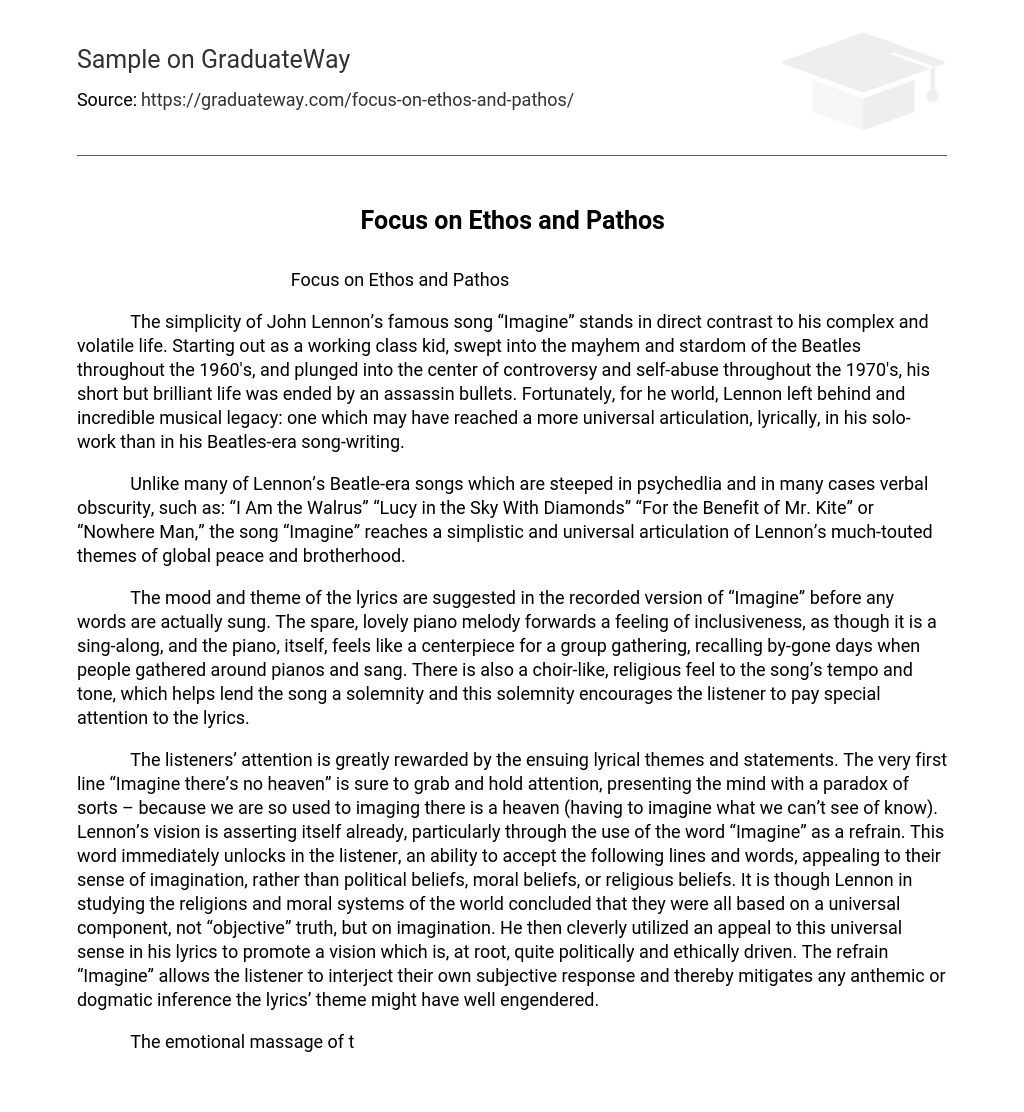The simplicity of John Lennon’s famous song “Imagine” stands in direct contrast to his complex and volatile life. Starting out as a working class kid, swept into the mayhem and stardom of the Beatles throughout the 1960’s, and plunged into the center of controversy and self-abuse throughout the 1970’s, his short but brilliant life was ended by an assassin bullets. Fortunately, for he world, Lennon left behind and incredible musical legacy: one which may have reached a more universal articulation, lyrically, in his solo-work than in his Beatles-era song-writing.
Unlike many of Lennon’s Beatle-era songs which are steeped in psychedlia and in many cases verbal obscurity, such as: “I Am the Walrus” “Lucy in the Sky With Diamonds” “For the Benefit of Mr. Kite” or “Nowhere Man,” the song “Imagine” reaches a simplistic and universal articulation of Lennon’s much-touted themes of global peace and brotherhood.
The mood and theme of the lyrics are suggested in the recorded version of “Imagine” before any words are actually sung. The spare, lovely piano melody forwards a feeling of inclusiveness, as though it is a sing-along, and the piano, itself, feels like a centerpiece for a group gathering, recalling by-gone days when people gathered around pianos and sang. There is also a choir-like, religious feel to the song’s tempo and tone, which helps lend the song a solemnity and this solemnity encourages the listener to pay special attention to the lyrics.
The listeners’ attention is greatly rewarded by the ensuing lyrical themes and statements. The very first line “Imagine there’s no heaven” is sure to grab and hold attention, presenting the mind with a paradox of sorts – because we are so used to imaging there is a heaven (having to imagine what we can’t see of know). Lennon’s vision is asserting itself already, particularly through the use of the word “Imagine” as a refrain. This word immediately unlocks in the listener, an ability to accept the following lines and words, appealing to their sense of imagination, rather than political beliefs, moral beliefs, or religious beliefs. It is though Lennon in studying the religions and moral systems of the world concluded that they were all based on a universal component, not “objective” truth, but on imagination. He then cleverly utilized an appeal to this universal sense in his lyrics to promote a vision which is, at root, quite politically and ethically driven. The refrain “Imagine” allows the listener to interject their own subjective response and thereby mitigates any anthemic or dogmatic inference the lyrics’ theme might have well engendered.
The emotional massage of the song is one of universal inclusiveness: the piano, the melody, the refrain, the hymn-like repetition are all meant to stress the unity of humanity and this , along with the lyrics’ brave and thoughtful appeal for human rights and economic parity, comprise, in mt mind, Lennon’s highest achievement as a pop-lyricist.
Another pop-rock song (from roughly the same era) which utilizes a piano arrangement and simple, universally inclusive lyrics is Elton John’s “Saturday Night’s Alright (For Fighting).” The lyrics to this song were written by Bernie Taupin, who was John’s principle lyricist for many decades. These lyrics are among my favorite of the era because of their direct appeal to the “rock and roll” attitude, or soul, that resides in all of us. The song is also interesting, like Lennon’s “Imagine” for its scarcely concealed sympathy for the working classes. Although “Imagine” is a song meant to appeal to a global audience, “Saturday Night’s Alright (For Fighting)” delivers a more Anglicized message, being particularly concerned with British working-class youth.
This song has always fascinated me because of Taupin’s ability to generate so many characters in such a short lyric. Told from a 1st person point-of-view, the lyrics manage to sketch the family, work, school, and night life of an “average” working class kid in Britain circa-1970’s. A slight but persistent sense of aggravation and malaise drives the lyric, along with a sense of irony and social dissonance. However, Taupin’s socially conscious lyric has no chance of being shunted off as lecturing or boring because of his incredible gift for meter and alliteration, plus the driving, blaring simple piano melody which helps elevate what is essentially an introspective character study into a pop anthem.
Both “Imagine” and “Saturday Night’s Alright (For Fighting)” demonstrate the synthesis of pop-sensibilities and socially conscious observation and criticism. Both of the songs attain a sound marriage of lyric and melody and both have outlived the era in which they were composed, remaining as staples of radio airplay and factoring into the consciousness of subsequent generations.
Saturday Night’s Alright (For Fighting)
It’s getting late have you seen my mates
Ma tell me when the boys get here
It’s seven o’clock and I want to rock
Want to get a belly full of beer
My old man’s drunker than a barrel full of monkeys
And my old lady she don’t care
My sister looks cute in her braces and boots
A handful of grease in her hair
Don’t give us none of your aggravation
We had it with your discipline
Saturday night’s alright for fighting
Get a little action in
Get about as oiled as a diesel train
Gonna set this dance alight
`Cause Saturday night’s the night I like
Saturday night’s alright alright alright
Well they’re packed pretty tight in here tonight
I’m looking for a dolly who’ll see me right
I may use a little muscle to get what I need
I may sink a little drink and shout out “She’s with me!”
A couple of the sound that I really like
Are the sounds of a switchblade and a motorbike
I’m a juvenile product of the working class
Whose best friend floats in the bottom of a glass
http://www.eltonography.com/songs/saturday_nights_alright_for_fighting.html





